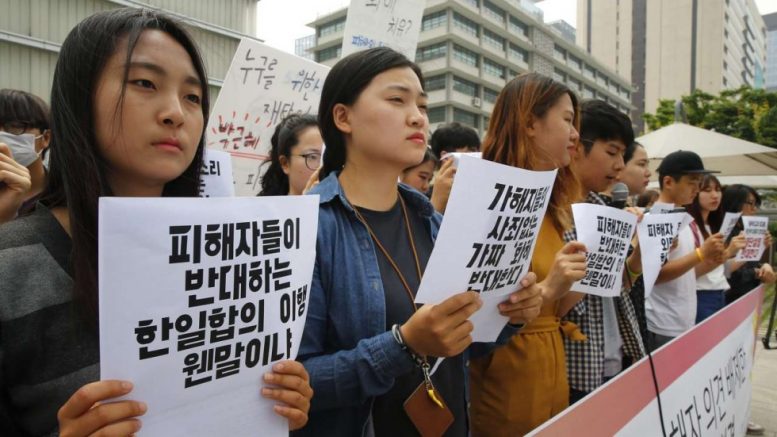The Republic of Korea and Japan reached a potentially revolutionary agreement on the issue of comfort women on December 28, 2015. The deal is expected to end the two countries’ dispute over Japan’s sexual harassment and other war crimes during World War II, but there are concerns that it may not come to fruition.
Comfort Women – A Grim Experience
Japan’s military might have enabled it to occupy several Asian countries during World War II. Among many other alleged war crimes, it is the issue of sexual slavery that haunts it to date.
Japanese soldiers are accused of kidnapping women and forcing them to work in brothels to satisfy their sexual urges. Comfort women testimonies reveal a grim experience in which the women underwent harrowing and painful sexual harassment. In addition to the pain, it dishonored South Korean women as a whole and left the survivors with terrible and shameful memories.
Japan has been working hard to get past the issue of South Korean comfort women, and the deal was expected to be the breakthrough that the country has been searching for.
Making Amends
The highlight of the agreement between Japan and South Korea was that Japan would donate 1 billion yen (approximately 9 million) to a foundation that would cater to the needs of surviving Korean comfort women. On its part, South Korea would take steps to remove the comfort-women statues that have been erected at different places across Seoul, and especially the one just opposite the Japanese embassy.
However, this agreement faced great resistance from South Koreans and many people across Asia and all over the world almost immediately after coming to light. Those against it viewed it as a way of Japan bribing its way out of the issue. Survivors of this atrocity claimed that they were not consulted. Many people also doubted Japan’s sincerity as it has never officially owned up to this atrocity.
Japan has always been reluctant to agree that the Japanese Imperial Army committed war crimes by abducting and enslaving women; this has been one of the factors that infuriate South Koreans and especially surviving victims. Japan’s Foreign Minister Fumio Kishida stopped short of acknowledging Japan’s wrongdoing as he formally agreed that his country had been involved in war atrocities, failing to mention comfort women. Prime Minister Shinzo Abe also apologized to surviving comfort-women through Fumio Kishida.
An Obstacle to Development
The issue of South Korean comfort women is seen as an obstacle to enhancing the two countries’ political, social, and economic ties. It is also a threat to Japan’s soft power and image abroad, not only in Japan but also globally as concerned people in the West are also vocal about the issue.
Both Japan and South Korea acknowledge that there is need for greater cooperation especially considering the nuclear threat posed by North Korea. Both countries would also benefit from increased economic ties especially considering that China is dominating the region economically and militarily. Unfortunately, communication has been strained by the fact that there are uneasy tensions between the two countries’ foreign ministries.
Not Yet Formal
The agreement has not yet been implemented by the two countries’ governments almost two years since it was formulated. Considering the opposition by victims and concerned South Koreans, the two sides may make changes that reflect the will of the victims.
In the meantime, more and more countries are setting up comfort-women statues in support for victims across the region, and comfort women stories are sensitizing the world on Japan’s atrocities.



Be the first to comment on "South Korea’s Comfort Women – An Agreement to Bury and Unpleasant History"